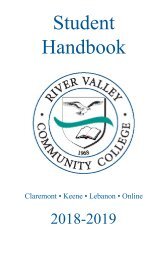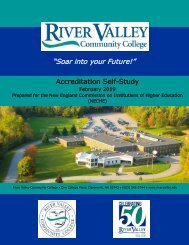Create successful ePaper yourself
Turn your PDF publications into a flip-book with our unique Google optimized e-Paper software.
may lead to formal revisions of course outlines submitted to Curriculum Team in order to<br />
change the course objectives. Some examples of changes made as a result of course<br />
evaluations include changing textbooks to better suit the level of the course instruction<br />
(AHLT 123R – Functional Kinesiology); and changing formats of classes from hybrid to face<br />
to face (MLTC 113R – Clinical Chemistry). Student evaluations had a major impact on<br />
revisions to the HSV 120R – Learning & Behavior course. This course was used by both the<br />
Early Childhood Education and Social Services programs. Specific student feedback on<br />
course evaluations indicated that this format was not effective, and students indicated they<br />
were uncertain why both majors were required to take the course together as they did not<br />
feel as though they were acquiring specific information on topics that they needed.<br />
Changes were made to course readings and assignments, but the same concerns appeared<br />
on subsequent course evaluations. With the revision of the Social Services Program, this<br />
course was eliminated from the program of study and the key content from this course<br />
was distributed into other required Social Service courses. The course remained in the<br />
Early Childhood program and was renamed and recoded as ECE 120R – Learning,<br />
Behavior, and Positive Guidance in the Fall of 2017. During Fall 2017 meetings with<br />
advisees, the ECE Program Director had none of the previous complaints that were<br />
associated with this course. The process for updating a course outline (including course<br />
objectives) is described in Standard Four. Beginning in Fall of 2017, the Curriculum Team<br />
has been working to ensure that competencies on the course objectives are measurable<br />
and not simply learning objectives or the table of contents from a textbook. Course<br />
outlines are expected to be reviewed by Program Directors every 5 years to ensure they<br />
are up to date and relevant. Most programs are in compliance with this request. Those<br />
programs that were not in compliance recently included Business, Accounting, and the<br />
Liberal Arts department. The new Business and Accounting Program Directors are<br />
working on updating their courses with a final completion goal of Fall <strong>2019</strong>. A new Interim<br />
Program Director for Liberal Arts was hired in Fall of 2018 and one of her current projects<br />
is to evaluate and update the English course outlines.<br />
Graduation Satisfaction Surveys are administered to all completing students and evaluate<br />
the effectiveness of all areas of the College. Information helps to inform administrators<br />
and directors about their areas of focus and influences changes to program and college<br />
orientations, course scheduling/delivery methods, and advising practices. The<br />
dissemination of the results of this survey have been inconsistent in recent years. The<br />
IVPSA is developing a plan to consistently administer this survey and provide results to the<br />
necessary parties.<br />
Many programs undergo national accreditation and are constantly using evaluation data to<br />
ensure they are meeting the standards of their national accreditation agencies. Even<br />
programs without national accreditation utilize their professional standards in order to<br />
prepare students for the workforce. For example, the Massage Therapy Program, although<br />
not accredited because the profession does not require graduation from an accredited<br />
program, utilizes the “Massage Therapy Body of Knowledge” to guide its curriculum.<br />
Another example are the programs that relate to Computer Technology, which have been<br />
designed around industry standard certification and utilize Cisco’s educational curriculum<br />
which prepares students for the Cisco CCENT and Cisco CCNA certifications upon<br />
completion. These standards guide and inform program work, and feedback from advisory<br />
20 | P a g e





